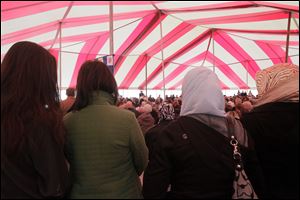
Joint projects can promote unity for religious groups
Expert says asking what is needed can be best option
10/8/2012
Representatives of several different religious groups gathered at the Islamic Center of Greater Toledo to show unity a week after an arson fire
More than 600 people attended the Islamic Center of Greater Toledo’s multifaith prayer service in Perrysburg on Sunday, non-Muslims alongside Islamic Center members, taking the opportunity to be together a week after the mosque was attacked by an arsonist.
Officials at the Islamic Center have spoken appreciatively about the support given through the years by greater Toledo residents and religious communities. At this time, Toledoans might like to make other efforts to work together with Islamic Center Muslims.
The Rev. Julie Taylor is consultant for deployment and training for New York City’s Disaster Chaplaincy Services. She is a minister who has responded to traumas at places of faith. When asked about how the community at large can help a hurting congregation and keep fellowship after the immediate incident, she talked about working with multifaith groups.
“One of the key pieces to doing interfaith work is to go beyond dialogue. Yes, this interfaith service is wonderful and important, and it’s important visibility. The next step beyond is to find things to work on together.”
Related content:
The Islamic School of Greater Toledo is temporarily based in Maumee at the Arrowhead Learning Center of Owens Community College. “Maybe another faith community could open their doors and really show that kind of solidarity and support,” Reverend Taylor said, but she also cautions about making the presumption that someone knows another’s needs.
“The larger community can ask what [the Islamic Center] needs,” she said. “In an incident like this, two things can happen: Often communities and individuals assume that they know what is needed and can bring what is not appropriate, or overwhelm. They’re not helpful, though with the best of intention. Or they do not do anything because they don’t want to offend.
“To combat those two extremes,” Reverend Taylor said, “the best thing to do is ask, to just ask. That’s powerful. It’s that willingness to serve as needed and not assume that what I want to give is needed.”
“One of the main tenets of all religions is to serve those in need so to find places for that to be done in a larger sense is to lend support in a way that may stop this [hateful] activity from happening in the future.
“Find ways for the many communities of Toledo to find a common cause to work together on,” Reverend Taylor said. “It may be something like a food program for hungry people, it may be a reading program, whatever it is, the different groups can find something to do together, to work shoulder to shoulder, to learn together. If they have committed to work at this homeless shelter together [for example] they’ll commit to do that.”
And they'll continue the solidarity that the Islamic Center speaks so highly of.
As a member of Unitarian Universalist Trauma Response Ministry, TK Barger has received training from Reverend Taylor.